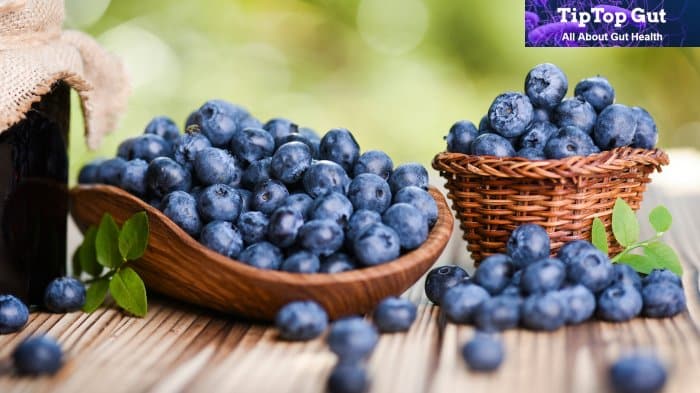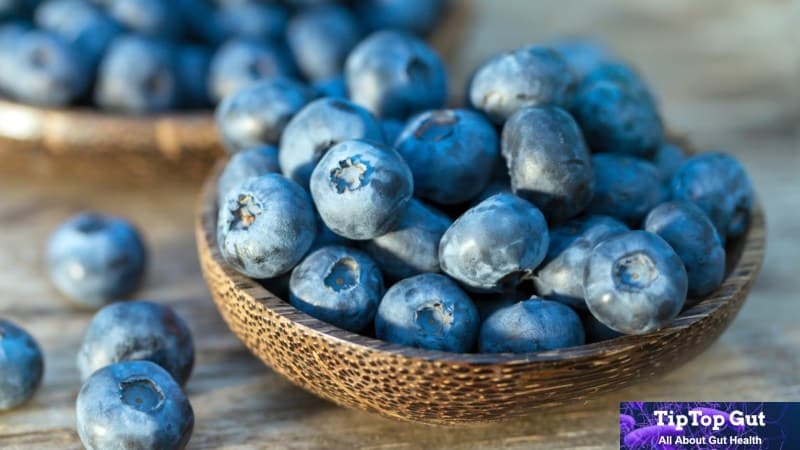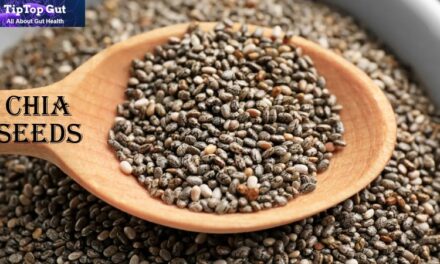In terms of nutrition, blueberries are a natural superfood. They are low in calories but are incredibly nutrient-dense and rich in prebiotic fiber, which gives your healthy gut flora the nutrition they require as well. Each tasty handful of the many essential nutrients contains some of the following:
Folate, Manganese, Copper, Vitamin K, Vitamin C, Vitamin B6, Folate, and Potassium.
In particular, the antioxidant anthocyanins that give blueberries their distinctive deep blue colors are a great source of antioxidants. So, are blueberries god for gut health? Let’s explore it.
Are Blueberries Good for Gut Health?
The natural plant components called polyphenols, which act as antioxidants in the body, are abundant in blueberries. Dark, blue-purple-hued fruits and vegetables include polyphenols, which are responsible for the blue color naturally present in these foods.
These polyphenols, which are also present in strawberries, blackberries, and acai fruit, are anthocyanins. When you encounter a fruit or vegetable that is blue, purple, or even reddish, it probably contains one or more of the plant compounds that give these hues.
How do polyphenols benefit the gut?
They are anti-inflammatory first and foremost, and inflammation is well recognized to contribute to various digestive problems.
Additionally, they assist in removing plaque from blood vessel walls, which improves blood flow to the brain from the gut-brain axis, which is essential for efficient digestion. As a result, they also help maintain healthy blood sugar levels. The polyphenols present in blueberries have antioxidant qualities, but they have also been shown to broaden the variety of some strains in the microbiome.
Blueberries’ naturally occurring fiber content also creates a prebiotic fiber source for bacteria to “feed” and thrive on to increase and support our gut, immunological, and brain health.
Blueberries and Gut Health
Taking care of your digestive system is crucial to feeling your best because brilliant mind and body health starts in the stomach. It makes sense that eating blueberries would be an excellent method to give your gut the TLC it deserves because blueberry fiber is such a fantastic prebiotic—and that’s exactly what the most recent scientific research is showing.
In a recent study, researchers fed a group of rats a high-fat diet for eight weeks while also supplementing their diet with blueberry powder. These rats had an essentially terrible diet, but they underwent some favorable metabolic changes, probably because of the prebiotic and antioxidant properties of blueberries:
- The integrity of their GI tracts increased, lowering the danger of toxins seeping out into their bloodstreams;
- The content of their microbiomes improved, with increases in suitable probiotic species like Bifidobacteria (which is especially crucial for sustaining wellness as we age);
- The integrity of their GI tracts increased, lowering the danger of toxins seeping out into their bloodstreams;
- The integrity of their GI tracts strengthened, lowering the risk of toxins leaking out into their bloodstreams;
- The content of their microbiomes improved, with increases in valuable probiotic species such as Bifidobacteria (which is especially necessary to maintain wellness as we age);
- Other variants associated with a healthy metabolism and insulin signaling.
Read More:
Biotics 8 Review: SCAM or A Legit Probiotic for Men?
Blueberries Enriched with Probiotics
Blueberries have been found to boost intestinal flora significantly. Prebiotics, which are a precursor to probiotics and help maintain healthy bacteria in the gut and colon, are abundant in them. In addition, the strong anti-inflammatory qualities of blueberries might change the intestinal flora and lessen inflammation.
Another well-known prebiotic is blueberries, consumed in fresh, frozen, dried, and supplement forms to support good digestion and prevent inflammation and gut dysbiosis. Due to its high fiber content, just one cup of it can meet our daily requirement for fiber by 14%.
Overall Health Benefits of Blueberries
A lot of these significant conclusions are supported by the additional blueberry study. In a different experiment, diets rich in blueberries also experienced an increase in the number of Bifidobacteria in guts, reinforced gut barriers, and lowered transient inflammatory reactions.
Additionally, the outcomes of a human investigation revealed that wild blueberries have an excellent potential for increasing GI tract Bifidobacteria counts and promoting general gut health.
It might be difficult to get enough prebiotic fiber in your diet, even if you prefer foods that are good for your gut, like blueberries. Our contemporary lifestyles can be detrimental to the microbiota in general. Consider adding a time-released, high-quality probiotic like PRO-15 to your diet as a supplement and blending an organic prebiotic powder into your favorite smoothies and soft foods to preserve intestinal harmony (and glowing health).
Blueberries contain an unexpected amount of microbial magic for such a little berry. Of all the lifestyle adjustments you may make to improve your health, it would not be easy to find one that is more delectable!
Berries offer a significant amount of essential vitamins and minerals high in antioxidants, whether consumed fresh, frozen, dried or in juice form. Below, we explore a handful of the many health advantages of these mouthwatering, colorful fruits, which are frequently granted superstar status for their nutritional content.

Blueberries good for the stomach
According to Greeley, berries, including blueberries, are beneficial for maintaining a healthy digestive system. In particular, blueberries provide helpful fiber for gastrointestinal health and act as pre-biotics to aid in “feeding” good gut bacteria, which may also help prevent esophageal, colon, and other cancers.
If too many of these cause stomach trouble in people with irritable bowel syndrome or other digestive issues, they may need to reduce them.
Minerals and vitamins
You might be shocked that one cup of fresh strawberries has about twice as much vitamin C as a tiny orange. Several bodily functions, including the production of collagen, a protein present in skin, bones, tendons, and cartilage, depend on this water-soluble vitamin.
Additionally, strawberries are one of the best natural sources of folate, a vitamin necessary for maintaining good health and preventing disease. You may also read; Best Vitamin for Gut Health: 7 Best Vitamins to Improve Gut Health
Many fruits, especially berries, naturally contain beta-carotene, which the body can transform into vitamin A. (a provitamin). It is essential for the immune system and cell formation.
Despite their small size, Berries are surprisingly potent in giving the body essential nutrients. They are a fantastic addition to your regular diet because of this and the fact that they are low in calories. You may also read; Best Fruit for Gut Health – Enjoy Fruits for Better Gut Health
Antioxidants
Antioxidants counteract oxidation which is linked to aging, inflammation, and the emergence of diseases, including cancer, heart disease, and arthritis. Examples of antioxidants include beta-carotene, lycopene, and vitamins A, C, and E.
Many studies prove that like other fruits, vegetables, legumes, nuts, and whole grains, berries contain antioxidants. The amount of antioxidants in a particular berry depends on the type of berry, the climatic and soil conditions during growth, the degree of ripeness, and the processing technique.
Dietary fiber can aid in maintaining healthy body weight, avoiding constipation, reducing some IBS symptoms, controlling blood sugar (glucose) levels, and preventing diverticular disease. Berries are a very good source of fiber, both in their fresh and dried forms. You can have a serving of berries daily to help you meet the 25–38g required daily fiber.
Berries that have removed all of their water have a longer shelf life. Compared to their fresh counterparts, they have more calories, carbs, fiber, and other nutrients per serving. This is crucial to keep in mind if you’re watching your sugar intake or attempting to reduce weight.
Dried fruits’ water-soluble vitamins (such as B and C) are lost during processing, which is a drawback. However, many manufacturers add these nutrients at the end, so check the label.
Reading product labels is a good practice in general, and doing so while choosing fruit juices could help you find kinds that are better alternatives to other goods because they have extra veggies, omega 3s, fiber, calcium, and probiotics. Additionally, it’s a good idea to hunt for juices devoid of sugar.
Indeed, berries stand up to all the hype. They are delectable, adaptable, loaded with nutrients, including vitamins and minerals, and an excellent source of fiber. These luscious fruits support a healthy body and digestive system when they are a part of a balanced diet. Eat them frequently to reap their many advantages!
Antioxidants & Oxidation
The oxidation process occurs during routine cellular functions like metabolism and inflammation. Exposure to environmental contaminants such as pollution, tobacco smoking, UV rays, intense exercise, and alcohol consumption causes it to rise. In a nutshell, oxidation produces highly reactive, unstable chemicals (free radicals) that can destroy cells and tissues and damage DNA.
Antioxidants are compounds that stop and control these free radicals and the harm they cause. Although the body makes its antioxidants, outside substances support the body’s defense.
Read More:
60 Best Foods for Gut Health and Digestion: The Best Guide You Ever Need!
Heart Wellness
In numerous ways, blueberries are beneficial for our hearts. First, they are a naturally occurring supply of polyphenols, plant components that support healthy blood flow and ideal arterial function. This is crucial for our health because the health of our heart and our brain depend on healthy blood flow.
Because of these potent substances, blueberries are also anti-inflammatory. Inflammation can lead to various health issues, including the gut and joint problems, artery plaque, and more.
Blueberries’ natural supplies of phytonutrients called polyphenols give them their powerful impact. In addition to improving blood flow to the brain, polyphenols also serve as anti-inflammatory agents that remove plaque from our arteries and even support gastrointestinal health.
Maintaining a healthy weight
In addition to being low in calories and high in fiber, blueberries are also loaded with chemical compounds that support a healthy metabolism and ideal weight.
In mice fed a high-fat diet, supplementing with blueberry juice avoided excessive weight gain, and blueberries added to the daily diet of overweight rats allowed them to lose belly fat.
Mental acuity at all stages of life
Blueberries are serious brain nourishment, regardless of age, whether you’re in elementary school or a grandma (or anywhere in between!). Wild blueberries were found to enhance memory and cognition in a study involving kids aged 7 to 10.
10 Older folks who are already suffering from cognitive problems can also benefit from the brain-boosting properties of blueberries. Numerous studies demonstrate that eating blueberries helps seniors’ memory and cognitive performance while delaying further decline.
At the cellular level, defence.
Your body’s cells must work together as a team to be healthy. According to studies, eating this sweet fruit seems to be a good method to encourage your body’s cells to work together healthily. Numerous animal and in vitro studies have shown a link between blueberries and the intestine, prostate, stomach, and breast cellular health.
The average antioxidant content of berries and berry products was among the highest compared to the other food groups examined.
According to Greeley, berries, including blueberries, are beneficial for maintaining a healthy digestive system. In particular, blueberries provide helpful fiber for gastrointestinal health and act as pre-biotics to aid in “feeding” good gut bacteria, which may also help prevent esophageal, colon, and other cancers.
Boost Bone Health
Some sources say blueberries are high in minerals like calcium, iron, magnesium, phosphorus, and zinc. These foods are all recognized to improve bone health.
Concluding Now!
Blueberries have a remarkable amount of microbial magic for such a small fruit. It would be challenging to discover a lifestyle modification that could be more delectable among the many you might adopt to improve your health.
Stock up on blueberries the next time you go shopping, whether fresh or frozen. Given the benefits they will have for your skin and overall health, you won’t regret eating them or be able to stop yourself from doing so.
Read More:
Is Keto Good for Gut Health? Surprising Facts Unveiled 2022
FAQs about Keto and Gut Health
What happens if I regularly consume blueberries?
Blood pressure, blood sugar control, diabetes management, cancer prevention, and mental wellness are among the benefits of blueberries. One cup of blueberries contains 24% of an adult’s recommended amount of vitamin C.
Do blueberries cause intestinal discomfort?
People with IBS and fructose malabsorption or intolerance may experience digestive discomfort from the fructose in blueberries, including bloating. More so if you consume an excessive amount of blueberries.
Do blueberries cause inflammation?
Flavonoids, a class of vitamins and antioxidants that reduce inflammation, are abundant in berries, especially blueberries. Additionally, they contain components that manage your immune system, which may reduce chronic inflammation.
What about blueberries and leaky gut?
Antioxidants and great anti-inflammatory qualities in blueberries can maintain a leak-free stomach. They also include quercetin, a fantastic antioxidant that promotes a balanced immunological response. In addition, blueberries are a good source of fiber and vitamins A, C, and K.
How frequently should blueberries be consumed?
The simple and practical recommendation is to consume one cup of blueberries daily to improve cardiovascular health.
Which fruit has the highest anti-inflammatory capacity?
These gem-like fruits, which range from blueberries and cranberries to strawberries and blackberries, have significant antioxidant and anti-inflammatory properties.
Read More:
Best Probiotic for Gut Health and Bloating: According to A Health Expert
Best Over the Counter Probiotic for Gut Health: Easy Guide 2022
Best Probiotic for Gut Health and Weight Loss: An Ultimate Guide 2022
Best Probiotic for Vaginal and Gut Health: The Best Guide 2022

















